How do you cope with your child's unsolved murder?
- Published
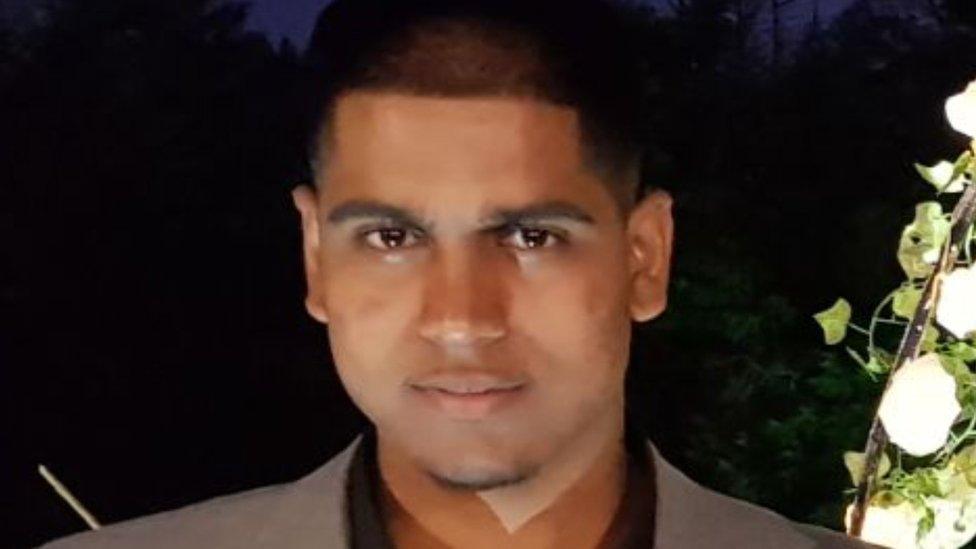
Amaan Shakoor was killed in a case of mistaken identity, police believe
Mohammed Shakoor does not know who killed his 16-year-old son Amaan, who was shot outside an east London leisure centre five years ago. A culture of silence has seemingly stopped those who could identify the killer from speaking to the police and no charges have ever been brought.
Earlier this month, and just yards from where Amaan was shot in Walthamstow in April 2018, another 16-year-old, Renell Charles, was stabbed to death.
Mr Shakoor, who says his grief has been deepened by not seeing justice for his son, has been speaking to the BBC about his coping mechanisms. Here, in his own words, he explains how he has processed Amaan's death, and what advice he would give to Renell's family.
'What was it that I did wrong?'
For this to happen to 16-year-olds, it's a shock to the system.
We just came back from holiday on Friday and as soon as we landed and got into the car, my other son got a message from one of his friends and said, 'oh no, there's been a stabbing outside'.
That really hit me hard. My thoughts really go with the family, especially with the mother. I can truly say I know exactly how they feel.
No matter what you do, you don't come to terms with it, you just learn to learn to live with it. It's been five years now and it's still raw.
You think, 'What was it that I didn't do? What was it that I did wrong? What could I have done better?'
'My whole family took a month off work'
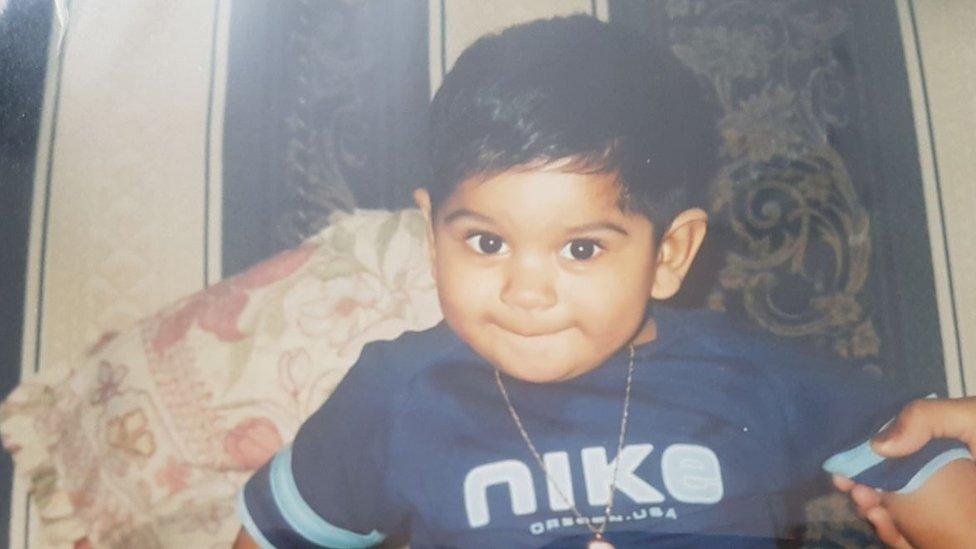
Amaan was a sweet boy who was close to his family
You don't expect your kids to go before you do. The void, the enjoyment of him, growing up and maybe getting married and having children and finding a job and that sort of stuff, that's what's been taken away from us.
We need to live without that.
When Amaan was killed, my whole family took a month off work. My brothers, cousins, nephews, our other children, they all spent that month with us at our house. They would say 'don't worry about the food, the cleaning, we'll sort that out, you rest'.
When you're left alone, you start thinking all sorts so you need to have people around you during that time. It was really comforting and I'm really grateful to them. Families are there to help and support each other and that is exactly what they did.
Amman, bless him, he was very, very, strong. Quite naïve, very sweet. I spent a lot of time with him, doing schoolwork and stuff. We became quite close and he was very close to his mum. He was a shy boy, he didn't really leave the house much.
He loved computers and mathematics, he used to help me with my work, doing spreadsheets and stuff like that.
It was only later when he was 11, 12 years old that we pushed him to go out with his friends. We said to him that we don't mind if you want to be dropped off to your friends, or if you want to go to the cinema or go to eat, just get out of the house and try to be a little bit more sociable.
That's when he started doing that. He was changing himself and developing into a teenager.
But then there was interference from his friends, who I called the wrong type of friends. I was constantly trying to warn him, saying 'just stay away from certain people, you've got good friends, just stay with those'.
'A fatal one-off'
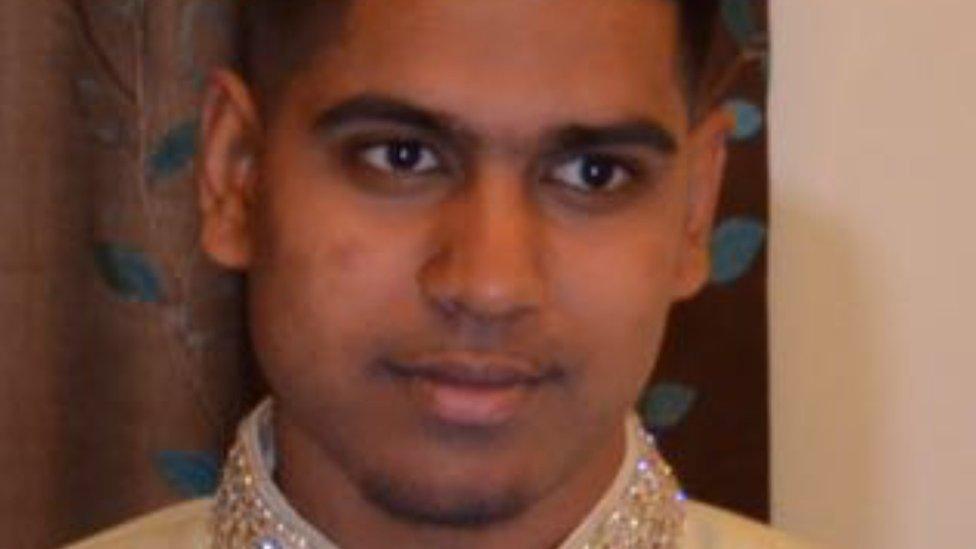
Amaan was 16 when he was shot
I would say 'if you need anything, come to me; if you need any money, you come to me, but do not get yourself into anything, we are your parents and we will try and provide you with everything you need'.
He would say it's alright.
But unfortunately, these are the same mates that were with him (on the night he died), who are still refusing to speak to the police.
On the night he died, he came home at 8.30 and asked his mum if he could have some grilled chicken. So his mum and I popped to the shop, bought him some chicken, and that was sadly his final meal.
His friend then called him. He said to Amaan 'do you wanna come out?' This was about 9:15, 9:25.
Amaan said, 'no, I've got changed now, I'm going to rest in a bit, I'm tired and I'm just eating, so I'm going to play on my computer'. His friend insisted, saying 'please, just come for a little while'.
Then it was just that moment, that changed everything. He said, 'OK, I'm coming' and he went out.
He was quite supportive towards his friends, loyal, he wouldn't have let them down.
It was a fatal one-off.
'We believe that we will be reunited'
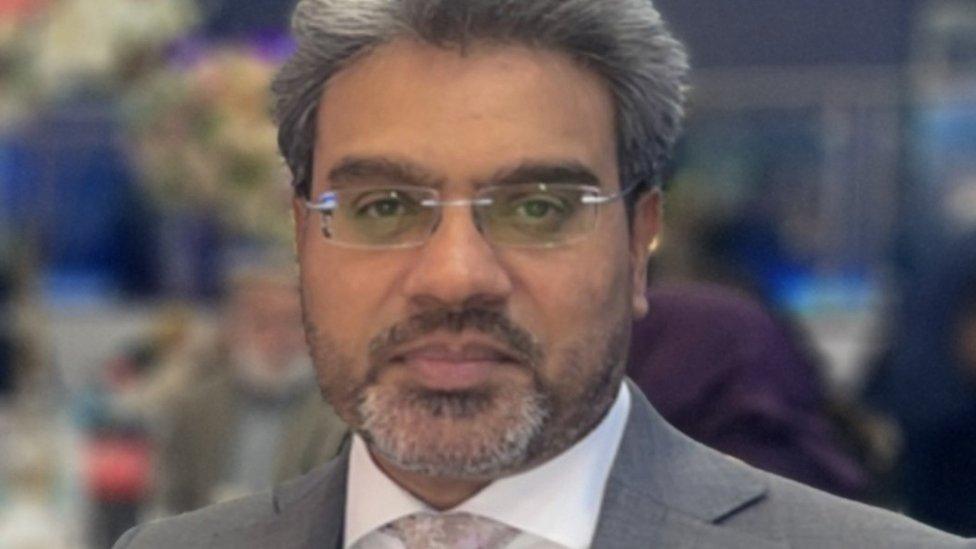
Mohammed, a welfare support worker, says the police need to do more
We just have to just wait and hope that somebody will come forward with something that leads to a prosecution. My brothers and I have put up a reward of £50,000. Even if they come forward just for the money, I don't care.
Had he not gone out that day, then we may not be having this conversation today.
The only consolation or the comfort we can give to ourselves is that it was God's will. We can't change anything and now this is our journey.
We believe that we, hopefully, will be reunited one day anyway.
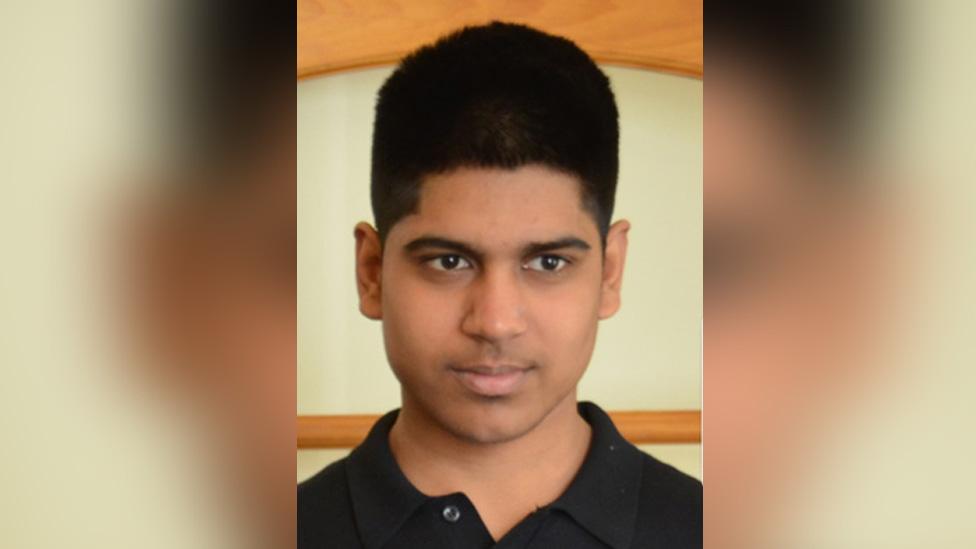
The police are urging anyone with information to come forward
I visit the cemetery. Every day, literally every day, unless I'm on holiday or in another area of country.
I have to go and make that connection, even if it's just 10 minutes or 15 minutes.
I don't know what happens after life, or whether they know that we come, but in our religion (Mohammed and his family are Muslims), it does say that they do know that you visit them.
As long as I have that little glimmer of hope, that he knows that I visit, then I will do anything in my power - come rain, shine, snow - whatever, it doesn't matter. I will make my way there, every, single, day.
People say to me, 'you shouldn't go that often, just try and cut it down a little bit'. When I go, I'm in tears crying, but when I come back, I feel quite content. I can actually walk away with a smile on my face as we've made that connection.
It's an extra way for me to keep that memory alive.
Are they hiding information?
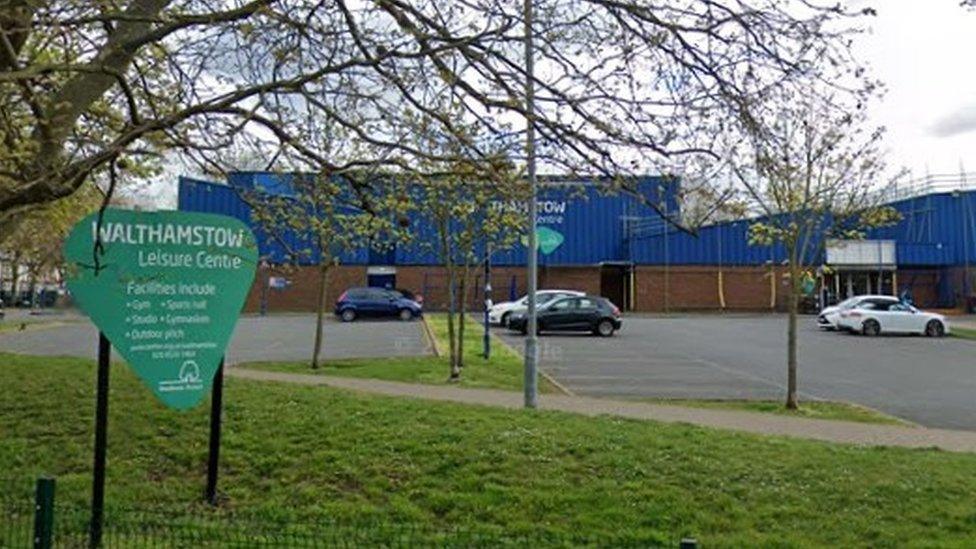
Amaan was shot in the car park of Walthamstow Leisure Centre
A couple of them, his friends who were with him when he died, they visit the cemetery. I've seen them there many times. They say, 'hello uncle, how are you?' They shake my hand, they stand at the grave.
The police say I'm not allowed to question any witnesses because it's not my job and it compromises the case.
But, you know, I look at them and will think, 'can't you volunteer any information? I'm sure you know something'.
If they're hiding information, then don't come. I don't want you here.
Every day I go to the gym, and then the cemetery. It works for me so I'm going to continue. It is my way of having some sort of control.
That time alone, my gym time, my cemetery time, is really valuable to me.
Once I've done that, then I can go on with the rest of my day. I can start my work, go shopping, spend time with my family, go out for a meal. I can do that but only after I've been to the cemetery. It splits my day up into different portions and then I deal with each one the best I can.
I have started medication as well. I think it's normal for someone in my situation to get help.
'The police must do more'
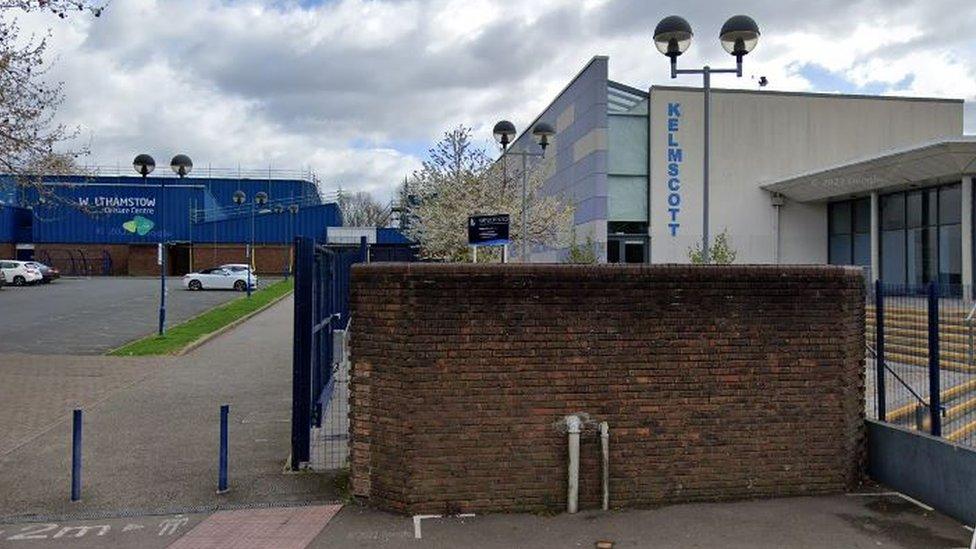
The head teacher of Kelmscott School said Renell Charles's death was the "darkest of days"
We moved in the same year. I couldn't get out of there quick enough.
I haven't been back to that area. I don't drive down that road. I can't do it, it's impossible for me. It brings back too many bad memories.
I'm still angry. I'm looking for answers and constantly battling with the police and trying to raise awareness to prompt witnesses to come forward.
We had a meeting with Sadiq Khan not long after it happened and then with our local MP Stella Creasy last year to give the police a little bit of a kick up the backside to say 'what's happening? Nothing's coming through'.
The police need to step up, to really show presence in that area.
We want them and politicians to concentrate on driving these criminals and drug pushers out of the area. Forget about cycle lanes and bus lanes and whatever, just give that a little bit less importance and put people's safety first.
That's more important.
'You try and find that balance'
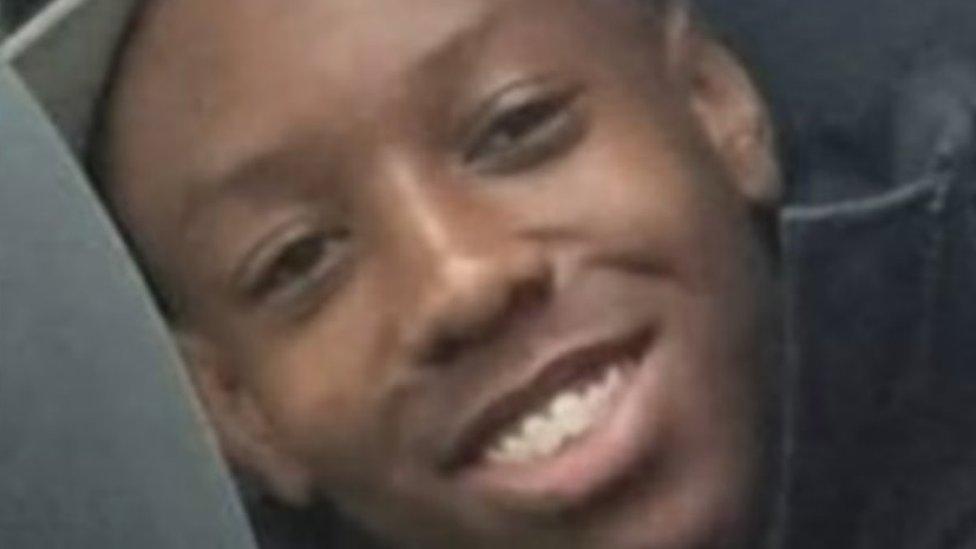
A teenager has been charged with the murder of Renell Charles
If I was ever to meet the family of this boy who's died, I would say you have to be strong and learn to incorporate what's happened into your life.
I can't beat myself up any more about it because you feel guilty, even just going on holiday, enjoying yourself having a laugh and a joke.
You try and find that fine balance where you try and live a normal life. I still have to support my family, my wife, my kids, my parents who are elderly.
I need to try and be mentally fit and capable of doing that. It's a constant battle.
When you talk to somebody who's been through the same thing as well, sometimes you don't know what to say, but just a little conversation between you two can just bring a little bit of comfort.
I think that's the kind of conversation that I'd like to have with the other boy's family.

In a statement, Det Ch Insp Kelly Allen from the Metropolitan Police said: "We know that there are people who must have information about what happened, and why.
"His family has been left with unanswered questions and it is frustrating that no one is prepared to provide them with the details they so desperately need to hear.
"We need to identify those responsible and arrest them. They took Amaan's life without a second thought. It is likely that they remain dangerous individuals and the streets of London will be much safer once they are found and convicted.
"I would urge anyone with information to come forward to us."

If you've been affected by issues raised in this story, the BBC's Action Line has a list of organisations who may be able to help.

Follow BBC London on Facebook, external, Twitter , externaland Instagram, external. Send your story ideas to hellobbclondon@bbc.co.uk, external
Related topics
- Published9 May 2023
